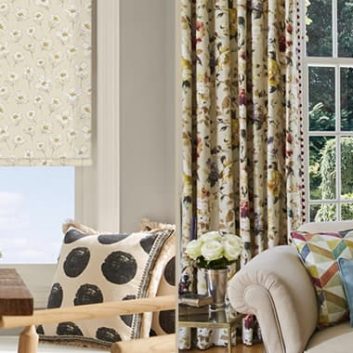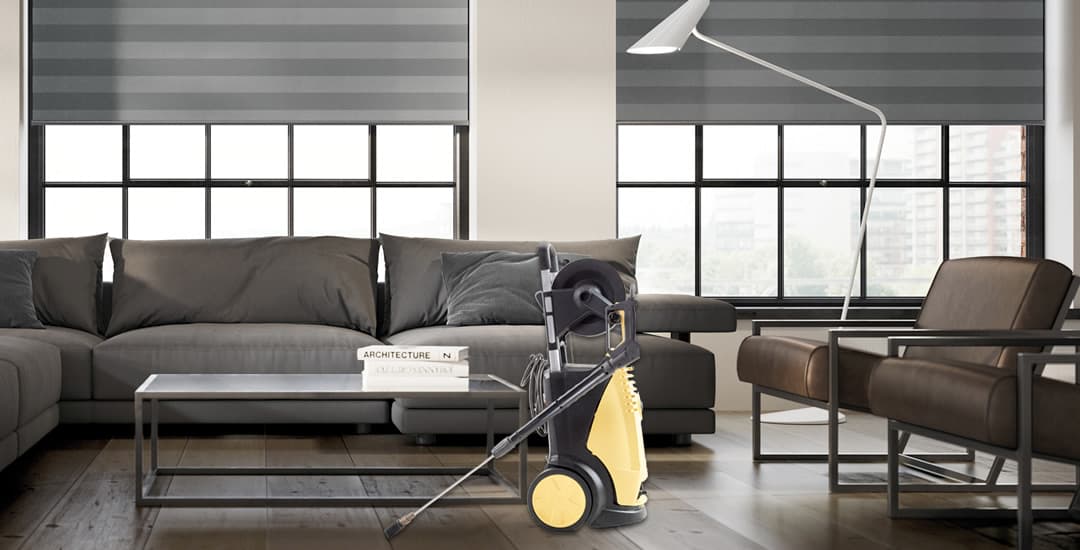
Mrs Hinch is That Cleaning Woman who has some off-the-wall but usually genius tips on cleaning the heck out of bleep, including window blinds. She’s got a massive fanbase too; many of whom have tips and ideas of their own on how to clean blinds, which they are often keen to share with each other and the internet at large too.
However, many if not most of these Mrs Hinch fan tips on cleaning blinds are best avoided; ranging from the type of advice that’s poor but that you might get away with once or twice, to advice that absolutely could and probably will herald the end of your blind the first time you take a swing at it.
A couple of well-known newspapers have taken to rounding up these dodgy tips and publishing them online, which isn’t helping matters; and as such, I am using this blog post to set the record straight about the three most widely publicised/shared Mrs Hinch blinds cleaning tips from fans that you should definitely avoid, and why.
Why roller blinds should not go in the bath
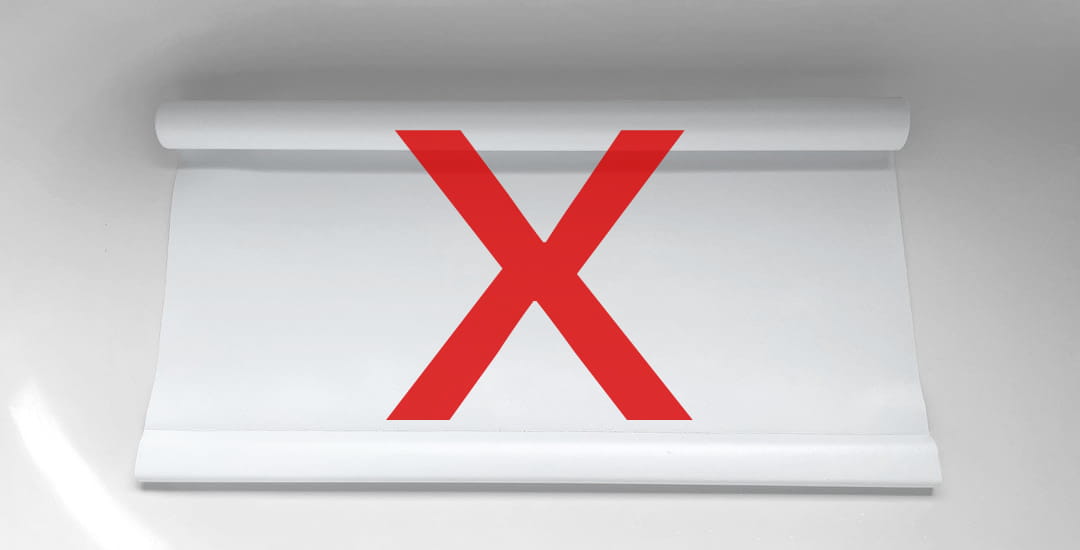
No names, no pack drill; several Hinch-ites have come up with some iteration of “clean roller blinds in the bath, it’s amaze, no regrets.”
The fan tips I’ve found about Hinching blinds in the bath range from telling folk to wash roller blinds off in there, soak them for hours, use Vanish/bio washing powder/similar, and many more.
However, the main fly in the ointment here is that none of these internet tipsters also mentioned whether or not their roller blinds were waterproof; and if they were then yes, waterproof roller blinds can generally be washed in the bath with warm soapy water, and live to tell the tale.
I don’t actually advise doing this, mainly because it’s overkill and far harder work than you need to put in; you can thoroughly wash waterproof roller blinds while they’re still hanging, and generally they only need dusting once in a while anyway.
The fact that waterproof roller blinds are uh, waterproof also means that stains don’t permeate their fabrics, and that cleaning compounds don’t penetrate the fabric either, rendering them useless unless they’re abrasive/harsh enough to actually damage the fabric along with any stains or marks you’re targeting too.
Polyester roller blinds though, which make up the majority of the UK roller blind population, can’t be washed in the bath full stop. Polyester and other non-waterproof roller blinds aren’t meant to be got wet, and will suffer from long term, frequent, or excessive exposure to water or even just humidity.
Polyester roller blinds are apt to suffer from colour run, fading, fabric shrinkage, water marking, and/or a number of other issues if got wet other than perhaps the occasional wipe over with a very faintly damp cloth.
This means that washing polyester roller blinds in the bath by means of showering them off, scrubbing them, soaking them, using hot water, and/or cleaning chemicals and washing powders on them, will almost certainly ruin them immediately.
Why you shouldn’t use carpet cleaner on blinds
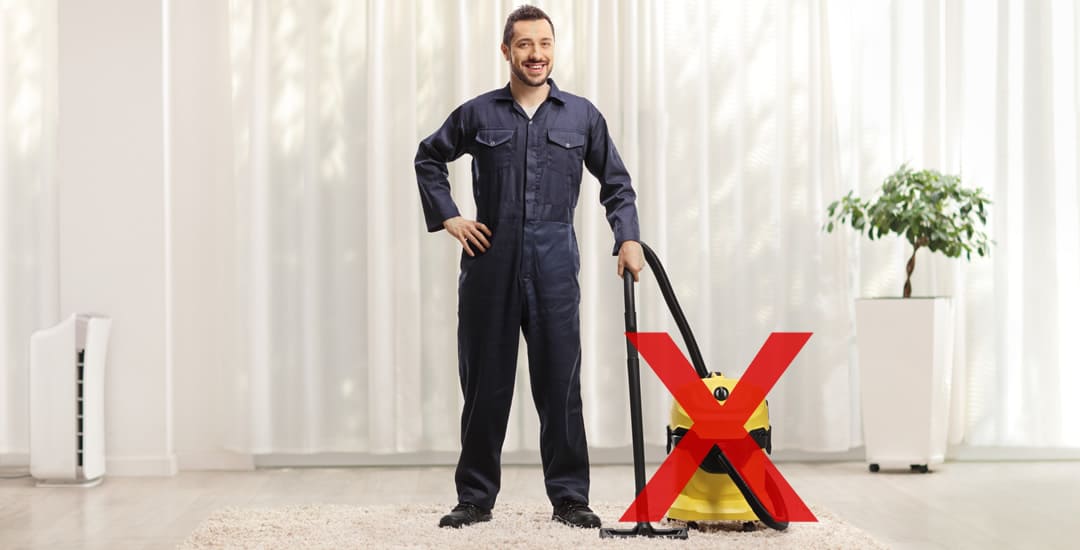
Hired a Rug Doctor from the local branch of Timpson and paid another £20 for a manor-house sized bottle of carpet cleaner to use with it, and want to make sure you get your money’s worth? Then it’s a good job you came here first so that I can tell you why you shouldn’t use carpet cleaner on blinds.
This is another blinds cleaning tip from Mrs Hinch fans that should be avoided like the plague, regardless of what type of blinds you have. I assume that the folk advocating that others try out carpet cleaner on blinds work for a blinds company that is seeking to boost sales tried this out on a fabric blind, once more with no indication of what type of blind they have or what it was made of.
Apparently, some types of carpet cleaner come with an inbuilt brush/scrubber – I am assuming this is the type you can buy in small bottles in supermarkets to target localised stains as opposed to the type shilled in dry cleaners to use in a carpet washer. Anyway, a couple of Hinchers specifically mentioned using this brush to clean the blind too, further compounding the issue.
So then, why shouldn’t you use carpet cleaner on blinds? Again, if your blinds are waterproof you might get away with this, but again again, it is total overkill. Even if you have a stain or mark on the blind, if it is a waterproof blind this won’t be too hard to lift and also, the cleaning solution you use won’t penetrate the fibres anyway. The brush though, might well damage the fabric.
The bigger issue/greatest damage is likely to be caused if you try to use carpet cleaner on non-waterproof blinds. This means most roller blinds, most vertical blinds, all Roman blinds, and all day and night blinds.
The water I’m assuming you’re going to add to the cleaner will cause damage of its own, and the chemical/cleaning compound itself will compound this. Carpet cleaners are fairly heavy-duty solutions, even the ones you can buy in the supermarket; they actually come with instructions advising you to test them on a small, discreet area of the carpet before rolling it out on the rest, and that’s when it is used as intended on a material that is also intended to be tough and resilient.
Non-waterproof blinds will absolutely die of carpet cleaner. The specific information published on their death certificates may vary, including but not limited to: discolouring or fading the fabric, destroying delicate fabrics such as you may find on Roman blinds, causing the fabric to shrink, and causing colours to run or change.
When it comes to using a brush or scrubber tool with said carpet cleaner, this alone will cause damage, particularly once more to Roman blinds and also day and night blinds, this latter of which have very fine mesh stripes that aren’t intended to be treated harshly.
Do not use carpet cleaner on blinds; Mrs. Hinch fans are not steering you down a good path here.
Why you shouldn’t use a pressure washer or power hose on blinds
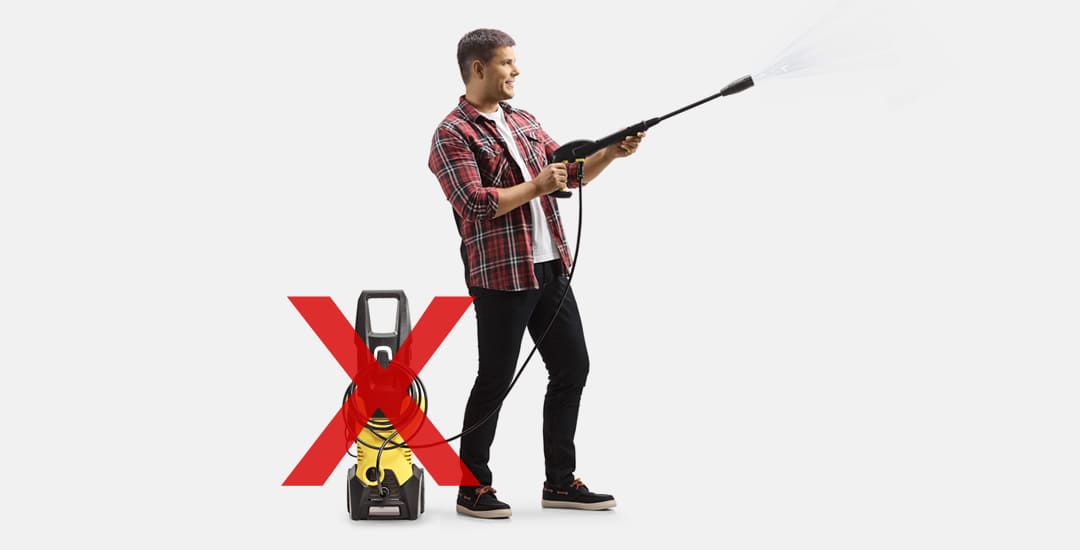
Power washers or pressure washers can be oddly satisfying to use when it comes to things like getting slime and moss off your patio or decking; they’re also excellent at lifting loose paint though, so they’re something of a double-edged sword in the cleaning stakes if you don’t know what you’re doing.
Anyway, if you’ve just bought a power washer and are keen to put it through its paces or have hired one for the weekend and don’t want to miss the chance to wash everything you own while you’ve got the chance, you might find your blinds shuffling about uncomfortably and hoping that they don’t catch your eye in this respect.
Unfortunately, a few Hinchers have already trodden this path, and I’m guessing those that found it went terribly wrong didn’t post about it on the internet because Reasons, but those who got away with it are definitely keen to encourage you to attempt the same. Do not fall for their siren’s call.
The general gist of the pressure washing blinds tips that Mrs. Hinch fans are sharing encourage you to take your blinds down, lay them outside, and power hose them off. I’m assuming nobody tried this on fabric blinds, but rather, those made of hard materials; but as was the case for the other blinds cleaning tips that Mrs Hinch had nothing to do with, the fans sharing them didn’t specify what type of blinds they targeted.
The potential options they could have covered are wooden blinds (real wood) faux-wood blinds (made of PVC), and Venetian blinds, made of lightweight aluminium slats.
Wooden blinds aren’t waterproof, and will become visibly and functionally damaged if pressure washed or power hosed just by virtue of the use of prolific amounts of water, particularly under pressure. Also, while wooden blinds bought from reputable manufacturers and retailers like us are far from flimsy, they are not destruction tested, nor intended to weather rough handling outside of normal everyday use. A powerful pressure washer or hose could actually damage the slats themselves, and/or the ladder tapes or lift cords holding them all together.
Faux-wood blinds are in my opinion the most hardwearing type of window blinds at all, and they’re waterproof too. While pressure washing them isn’t something I’d recommend (and will also be hard work/challenging as blinds are intended to be hung and left, not removed regularly and taken outside for a bath!) I am reasonably confident that pressure washing with the type of machine you can hire or buy for domestic or DIY use would not damage faux-wood blinds.
I don’t advocate for pressure washing faux-wood blinds either, mind; it’s overkill. The washing part itself might be the work of seconds, but it will take you far longer to actually get the blind down and put it back up again after, and faux-wood blinds are also fairly heavy (even in smaller sizes) as well as unwieldy.
I also have some concerns that the lift cord or ladder tapes of faux-wood blinds might become damaged by the pressure too; and that the water might well actually simply transfer dirt from the blind slats onto the fabric part and make that far harder to clean as a result, negating the point of the whole thing!
Finally, Venetian/aluminium blinds should not be pressure washed either. I don’t doubt that the washer would lift and remove dirt, but aluminium is light and flexible, and the slats of the blind might well dent and even buckle under the pressure of a powerful spray or hose. Also, while the slats themselves on Venetian blinds are waterproof, the lift cords that run through them are fabric, and are not. This means the pressure washer might damage them too.
Don’t follow these tips to clean blinds… Mrs. Hinch was not in the building
All three of the above tips/scenarios/cautionary tales were brought to you by fans of Mrs. Hinch. Blinds cleaning tips are something she has indeed covered a couple of times (which I’ve assessed, tried out, and provided feedback on here and here) but none of the three “tips” I’ve debunked in this blog post came from Mrs. Hinch, and she has never advised/suggested/approved that anyone follow them; because they’re a bum steer.




